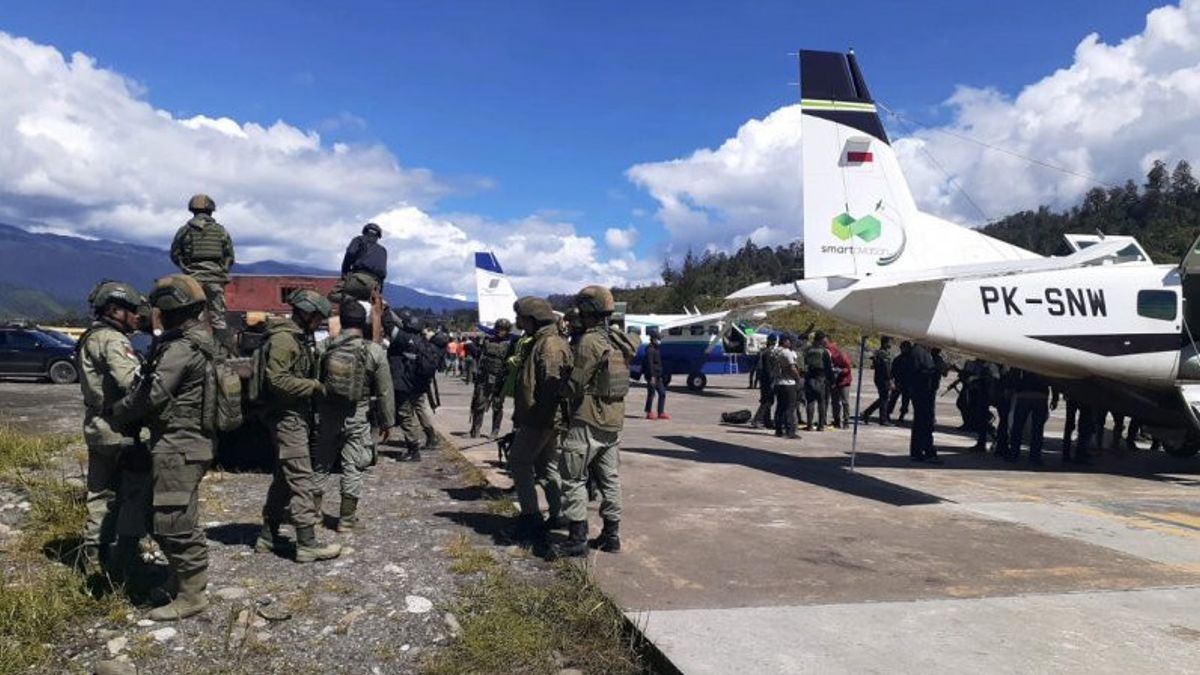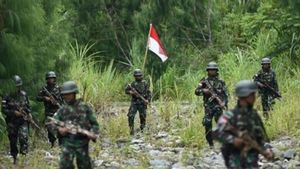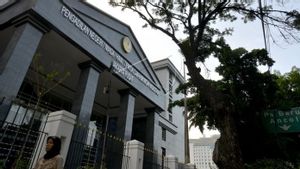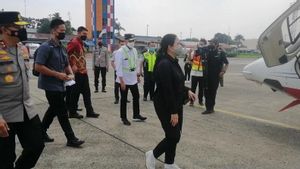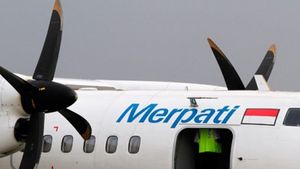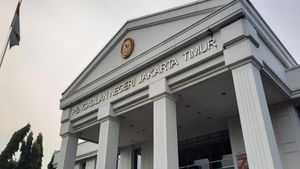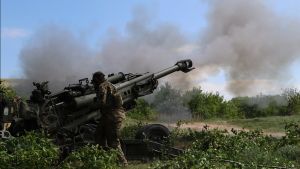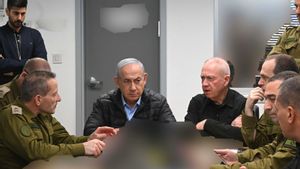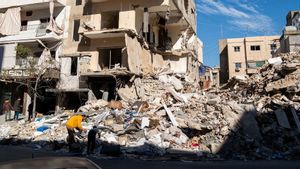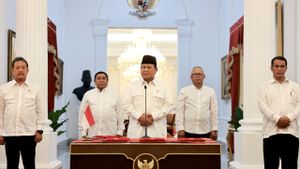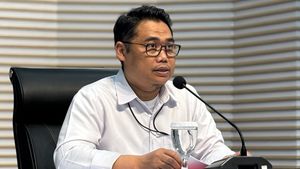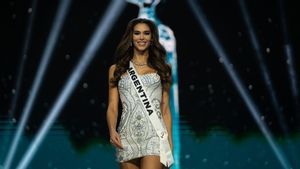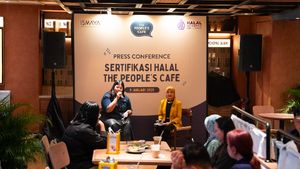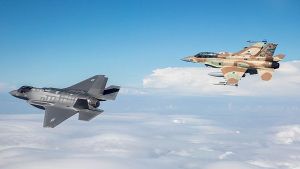JAKARTA - Member of Commission I DPR Tubagus Hasanuddin regretted that the term Free Papua Organization (OPM) was changed to the Armed Criminal Group (KKB). According to him, the change in the term OPM to KKB has also changed the paradigm of handling separatists in the land of Cenderawasih.
In fact, according to him, this group is just an ordinary criminal group. However, there is the great desire behind every criminal act so far.
The PDIP politician said that this separatist group had always wanted to be independent. Moreover, they have quite long traumatic memories in the New Order era.
"There is a deep trauma in the Papuan people in the New Order era without paying attention to human rights. There have been 11 military operations that have been carried out. This has caused trauma to the Papuan people," Hasanuddin said, Wednesday, May 5.
Furthermore, the former high-ranking National Army (TNI-AD) officer said that when he was still serving as an adjutant to President BJ Habibie, where he was asked to invite 100 Papuan leaders to Jakarta.
He said, there was a debate at the meeting. Papuan leaders asked for a referendum because there was a desire to be separated from the Republic of Indonesia.
"Finally, at that time a policy was taken in the form of granting Special Autonomy (Otsus) for Papua. Then, the large budget was disbursed to Papua," he explained.
However, he continued, the Special Autonomy budget was only enjoyed by the Papuan elite and did not flow to the lowest strata of the people.
"People at the bottom still have difficulty getting sweet potatoes, have difficulty getting access to health, and education is also untouched," explained TB Hasanuddin.
Therefore, he reminded that the handling of KKB in Papua must be measured, systematic and massive. Moreover, there was a military operation in the eastern tip of Indonesia.
"The troops involved in the eradication of separatists in Papua must be well controlled," said TB. Hasanuddin.
Military observer Sidra Tahta Mukhtar thinks the government must take a humanist approach to solve the problem of the Armed Criminal Group (KKB) in Papua. According to him, an exaggerated military approach would actually make the conflict more and more prolonged.
Like the method of the 4th President of the Republic of Indonesia, Abdurrahman Wahid alias Gus Dur, who dared to bridge the problems in Papua. Even though he had received a refusal to set foot on the land of paradise, Gus Dur was determined to open a space for dialogue that prioritized building mutual trust with the Papuan people. Even in his brief leadership, Gus Dur left a deep positive mark on the Papuan people.
"Indeed, from the start, the concept of coping with Papua, at least since the Gus Dur era, wanted to prioritize a humanitarian approach and an approach based on local identity. That's why even a typical Papuan flag can be raised," said Sidra to VOI, Wednesday, May 5.
According to Sidra, it is rather difficult if you want to nationalize a system of overcoming the law or violations of sovereignty or other crimes in Papua. Thus, acts of violence like now are not easily termed acts of terrorism which are handled by the Indonesian police but the National Army (TNI).
"Well, we used to have a discussion with Mr. Tito when he was the National Police Chief. He said that even though the escalation led to the threat of state sovereignty, which means that it is a portion of the TNI's role but still says it is a law violation phenomenon, hence the name KKB," he explained.
Meanwhile, groups like this in Papua have entered the 6th or 60th generation after independence, who perceive themselves that indigenous Papuans (OAP) have been labeled as objects of state discrimination for a long time.
"And that is seen as the role of the TNI in the past. That's why the first words of the Papuans, especially the 6th generation, are 'we are not treated humanely, there have been extraordinary human rights violations', and that has never been an objective trial in their eyes," said Sidra.
Even in the United States, said Sidra, the intensity of the discussion on Papua is very high for a country that has international attention.
Therefore, Sidra said, if the state's mindset wants to defend Papua, then how can we embrace it by not using a military approach that is too dominant.
"Maybe it needs gradual gradation (slow dialogue, red)," he said.
Sidra gave an example, military operations in Aceh and Poso that left trauma. Even though it is over, the former operation is still going on for a long time, maybe it could take a generation to erase the traces of the conflict that affects humanity, or the Poso people's perception of the country.
"I am worried that Papua is the youngest province in Indonesia, so pushing for independence also includes the strength of traditional religious leaders. So imagine the two most dangerous dimensions in the world when the religious and ethnic aspects fall into conflict traps. Papua is nationalism. triggered by the perceptions of both identities, "said the former expert researcher at the National Counterterrorism Agency (BNPT).
"Therefore, in my opinion, the military approach should be on a level to overcome. In fact, the basis of the problem now is latent trauma. This is what makes it difficult," continued Sidra.
Sidra is also worried that the elimination of the KKB will become widespread. Because the assumption of normal people is that fighting is the military facing combatants who claim sovereign territory. However, ordinary citizens are even seen as combatants, let alone what has become unique is being labeled as separatist terrorism.
"Papua has a different context, there is a long process going on. Handling is not the same as in other regions in Indonesia so that it accumulates resistance. This resistance in the context of the state is right to be present to provide security and prosperity to build education. That is violence against violence. It is better if violence is countered by the presence of an ideal state role, "he explained.
Once again, added Sidra, the prevention of Papua must reflect the presence of Indonesia as a citizen's servant so that if there is a problem like this in Papua, it must be embraced regardless of the conditions.
"The state has everything to do that. For example, the local government there has the technology, then it has built Papua with a few hundred trillion, now the special autonomy fund is being extended again," he said.
"Thus, in my opinion, it is very necessary to be humanistically approached, not an exaggerated military approach. It is necessary to make Papua a part of Indonesia forever, but if the military later there will be Papuan power globally because of a lot of support (for independence, ed). "Said Sidra Tahta Mukhtar.
SEE ALSO:
Military Operations Are Not a Solution
Member of Commission I DPR RI from the PKS Sukamta faction said that military operations were not the main solution to solving problems in Papua because it would lead to continued antipathy and violence against fellow Indonesian citizens and against the TNI-Polri apparatus.
"The security approach by prioritizing military operations in Papua was carried out during the New Order era to solve the problem of separatism in Papua," said Sukamta.
He cited the cases of Bloody Biak (1998), Bloody Wasior (2001), Wamena Bloody (2003), Paniai (2014), and most recently in Wamena 2019, which are proof that the military approach actually creates an endless cycle of violence.
Sukamta assessed that the problem of the Free Papua Organization (OPM) would not be resolved if the root problems of Papua were not completely resolved.
"The central government and the regional government of Papua must be serious about meeting the minimum standard requirements for health, education up to the upper secondary level, welfare by reducing the poverty rate below 10 percent, then communication equivalent to Jakarta-Papua," he said.
The second approach, according to him, is the deradicalization and deideology of the Free Papua movement by involving the National Counterterrorism Agency (BNPT), which has experience in countering terrorism for Papua, plunging into the ideological pockets of the Free Papua Movement at home and abroad.
According to him, the ideology of Free Papua must be changed towards the nationalism of the Republic of Indonesia.
The third approach, according to him, is to improve local governance, the government through the Ministry of Home Affairs, Kemenpan RB in collaboration with the Papuan regional government, the Police, the Attorney General's Office, the BPK, the KPK must seriously address issues of budget efficiency, government management, and public services in Papua.
"From 2001 to 2019, the total special autonomy funds for Papua and West Papua amounted to Rp. 83 trillion and Rp. 8.37 trillion was allocated in 2020. However, developments in improving the quality of human resources, governance, and public services have not changed significantly," he said.
According to him, the central government must seriously oversee the special autonomy fund, not only transfer funds to the regions and then give up on overseeing the management and achievement of its targets.
The English, Chinese, Japanese, Arabic, and French versions are automatically generated by the AI. So there may still be inaccuracies in translating, please always see Indonesian as our main language. (system supported by DigitalSiber.id)
